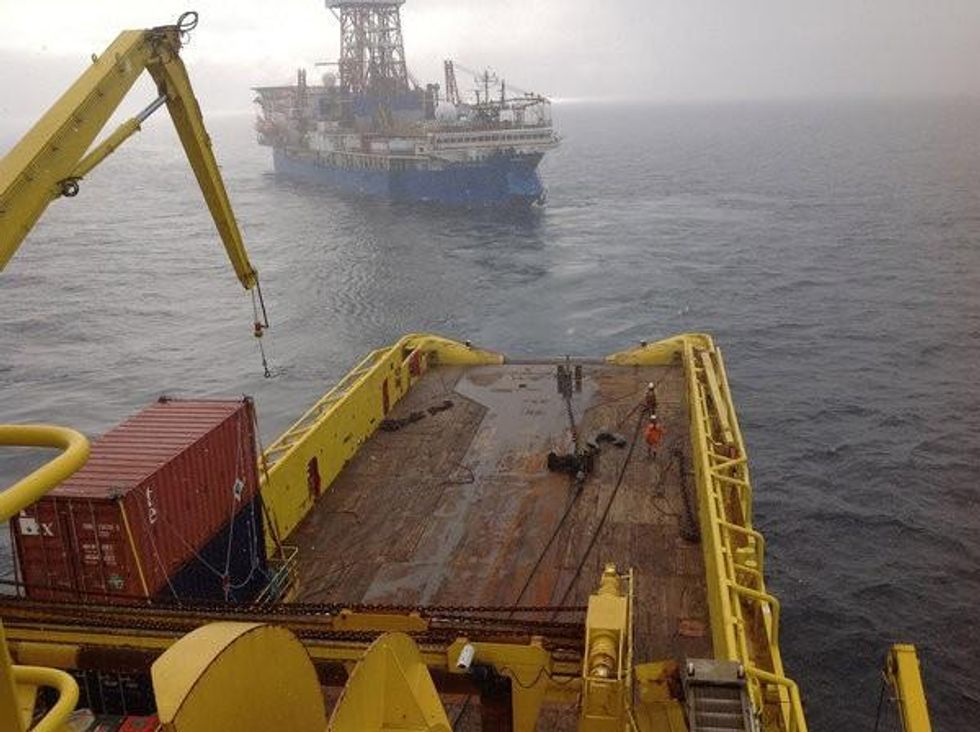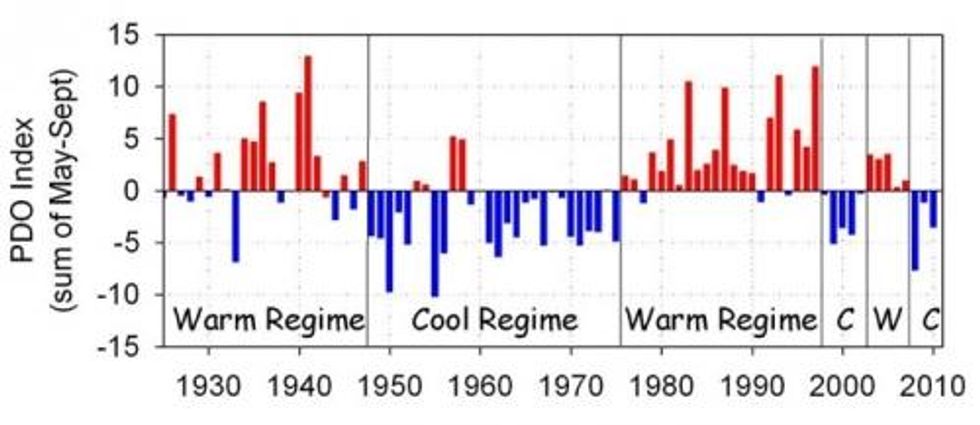Last week as Shell was getting ready to poke the first hole in the Chukchi Sea floor in Arctic Alaska to begin exploratory drilling, I was getting ready to give two talks in Alaska--the concluding lecture of the Next North Symposium at the Anchorage Museum on 9/8, and one at the Noel Wien Library in Fairbanks on 9/11 as part of the Northern Voices Speaker Series hosted by Northern Alaska Environmental Center in partnership with the Gwich'in Steering Committee. While there something remarkable happened over the weekend--perhaps the shortest-lived "beginning" of drilling anywhere. "Only a day after Shell Alaska began drilling a landmark offshore oil well in the Arctic, the company was forced on Monday to pull off the well in the face of an approaching ice pack. With the ice floe about 10 miles away, the Noble Discoverer drilling rig was disconnecting from its seafloor anchor Monday afternoon in the Chukchi Sea, about 70 miles from the northwest coast of Alaska," the Los Angeles Times reported. There is much more to this story of ice and Shell.
In late 2010, when the US Department of Interior was gathering public comments about Shell's drilling in the Beaufort and Chukchi Seas, I
wrote a piece "After the Arctic Spill--Shell, Palin and Obama." I had imagined a fictional scenario to take place in 2012, before the presidential election, in which an iceberg from Greenland had floated and destroyed Shell's drilling rig causing a large spill in the Arctic Ocean. There was a lawsuit. I had imagined the court ruling would be something like this: "The court finally ruled in favor of Shell and determined that the real culprit was not Shell but 'climate change' that melted the Greenland ice-sheet resulting in these large 'rogue icebergs' that drifted from a 'foreign country' and arrived in America's Arctic water and destroyed a foreign company's (Shell) rig. There was nothing Shell could do to fight nature and save the rig, the court determined. It was a double-victory for Shell--they didn't have to pay any fine and they could now keep drilling many more wells because you can't kill a dead sea."
I was wrong. We didn't need a foreign iceberg from Greenland. A homegrown ice floe--30 miles by 12 miles chunk of sea ice in the Chukchi Sea was enough to stop Shell on Monday.
As soon as my "After the Arctic Spill" piece was posted in the
Huffington Post, Shell conveniently placed in the HuffPost Green page underneath my piece an ad, "We Have the Technology. Let's Go." So I
wrote another piece in response to the ad. I borrowed Ralph Nader's words and wondered if any journalist or the government was asking Shell, "would you be specific, give examples and cite your sources for your general assertions [about the technology Shell was boasting they had]?" No one. It has taken two years for us to finally understand the technology Shell had in mind. It's called "pack up and move." Perhaps Shell worked with a ragtag team of backpackers to develop this technology, as we backpackers have perfected it over the years. In that piece I had written, "If melting of sea-ice continues apace due to climate change and say in 100 years the Arctic Ocean becomes ice free for 12 months of the year--then and then only I think Shell's drilling could possibly make sense. So I'm not suggesting that we close the doors on Shell's Arctic drilling forever. We can certainly reopen the subject perhaps a century from now,
After the Ice, if we still need oil."
I was wrong about the sea ice situation in America's Arctic and subarctic seas. It has gotten more complicated since then. The big question we need to ask now: "is the large ice floe in the Chukchi Sea that Shell recently encountered an exception or could this become the norm?"
This year, the extent of Arctic summer sea ice hit lowest ever, breaking the previous 2007 record. "Scientists at the University of Colorado's National Snow and Ice Data Center and NASA said that, as of Sunday [August 26], the Arctic sea ice cover had shrunk to 1.58 million square miles, the smallest area since satellite measurement began in 1979. With the melting season not yet over, the ice will almost certainly contract further in the coming weeks before it begins to re-form,"
The Washington Postreported.
Now comes the confusing news. In addition to Shell's lack of preparedness, regulatory hurdles and protest from Inupiat communities and environmental organizations, one more thing that delayed Shell's drilling plan this year has been the enormous amount of sea ice in the subarctic Bering Sea, and in the Chukchi Sea to the north. Why are there so much sea ice in the Bering Sea and the large ice floe in the Chukchi Sea that stopped Shell? Surprisingly Republican lawmakers are yet to shout, "told you so, global warming is a hoax." Let me explain.
The Arctic sea ice indeed is melting at an unprecedented rate, reaching lowest ever this year, and is causing tremendous survival challenges for a host of ice-dependent marine species, including narwhal, polar bear, walrus, seals, and sea birds, and threatening coastal indigenous communities. While the circumpolar north as a whole is warming at a rate twice that of the rest of the planet, something regional is taking place now that has great consequences for Shell's Arctic drilling.
The reason Bering Sea and Chukchi Sea are experiencing extensive sea ice and some of its coldest temperatures in the past few years is due to a regional phenomenon called Pacific Decadal Oscillation (PDO). In 2010, writer Wendee Holtcamp accompanied scientists aboard the research vessel Thomas G. Thompson and wrote blog pieces for
Nature about the Bering Sea Project, a multi-year multi-disciplinary partnership of the National Science Foundation and Alaska's North Pacific Research Board to understand how climate change is affecting the Bering Sea ecosystem. Following year, in an article, "The Big Chill in the Bering Sea" Holtcamp wrote, "Research has shown that the Pacific Decadal Oscillation, a long-term atmospheric circulation pattern, is largely responsible for the Bering Sea's recent temperature flip-flop, though other factors also play a role. Most people are familiar with the El Nino/Southern Oscillation (ENSO), which includes El Nino and La Nina, but the PDO differs in two ways. First, it typically operates on longer time scales, shifting every 20 to 30 years, rather than six to 18 months with El Nino." If you look at the map from the US National Oceanic and Atmospheric Administration (NOAA) that accompanied her article you'll see that we recently entered the cold phase of the PDO in the Bering Sea, meaning the next several decades the Bering Sea and the nearby Chukchi Sea will likely experience colder temperatures and more extensive sea ice.

This is very bad news for Shell as it will likely threaten their drilling operation, again and again, with large ice floes, but it's very good news for Arctic marine life struggling to survive in a melting north. In a recent article, "Arctic ice: Floes impeding Shell Oil hold promise for Pacific walrus," Jill Burke wrote in Alaska Dispatch, "that floe and others are a welcome change for thousands of Pacific walrus, which made long and treacherous journeys to reach Alaska shores in recent autumns.... For the last three years in a row, and in 2007, the massive mammals blanketed beaches, sometimes with fatal consequences.... in 2009, when more than 100 walrus, mostly juveniles, were found dead after a large haul-out at Icy Cape, on the Arctic Ocean shore southwest of Barrow. And it's thought that walrus have come ashore in increasingly large numbers recently after exhausting themselves in the search for sea ice on which they can rest and launch feeding forays into the rich waters of the Continental Shelf. A 2010 haul-out at Point Lay, not far from Icy Cape, was estimated to contain at least 10,000 animals." Following year dead baby walruses were found on barrier islands off of Point Lay, along the Chukchi Sea. The federal government is currently evaluating whether walruses should be put on the Endangered Species List, but a decision is not expected till 2017. A decision on walrus should be higher priority than Shell poking holes in the Arctic seabed now.
Marine mammals are not the only ones struggling to survive in a warming Arctic Ocean, but also the coastal indigenous communities, due to erosion and more severe and frequent storms--all due to climate change. The second day of the Next North Symposium at the Anchorage Museum was devoted almost entirely to discuss the severe coastal erosion and potential relocation that the Inupiat community of Kivalina along the Chukchi Sea coast is facing. The webpage of "Sea Grant: Living on Alaska's Changing Coast," a project of the University of Alaska states, "Six Alaska communities are planning partial or total relocation, and 160 have been identified as threatened by climate-related erosion by the U.S. Army Corps of Engineers."
Why are we now sending Shell to get more oil that we will burn and send more CO2 in the air that will cause more arctic warming? In light of all the recent developments the Obama administration has an unique opportunity, a turning point--not grant Shell the final permit, but instead start work on a thorough Environmental Impact Statement, a requirement of the National Environmental Policy Act and something the administration has avoided so far. Such an extensive study could help us understand all aspects of both the melting of Arctic sea ice and the regional PDO, and the impacts these have on marine life and on the cultures of the indigenous communities. Before Shell kills the Arctic Ocean, the minimum we expect from our government is to delay Shell's operations so that we have a better understanding of the rapidly changing northern habitat that our human and nonhuman neighbors call home.
After my talk at the Anchorage Museum, the symposium ended with a magical performance by young Inupiaq artist Allison Warden. Her words, her voice, her performance transported us not to a romantic north, but the north now, a political north, in which caribou and polar bears are struggling to survive, in which we have an obligation to resist industrial destruction. As she was finishing, still part of the performance, she kept saying, "thank you," "thank you," to us in the audience for our part in helping to protect the north. Now, I'm relaying her message to you with the hope that you too will join in stopping Shell and industrial destruction of the Arctic.

